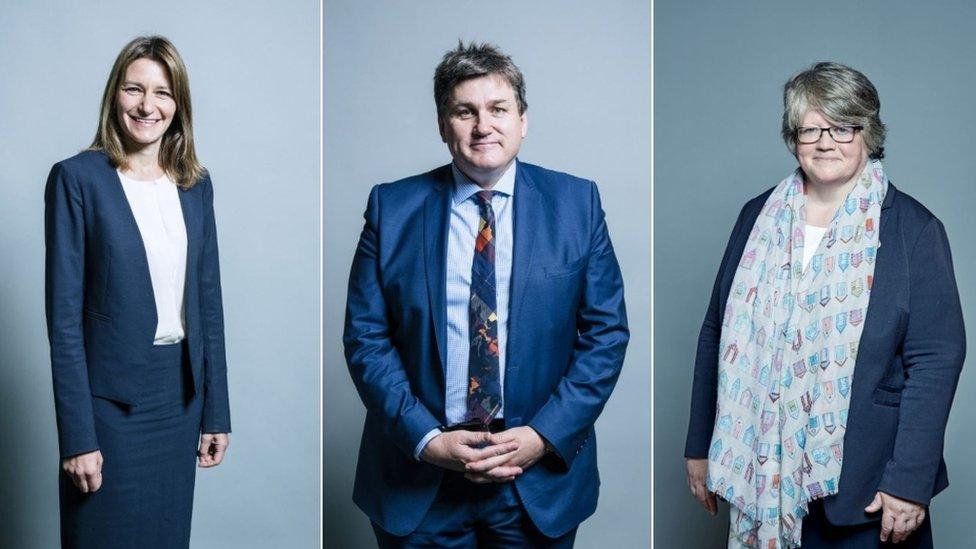Boris Johnson appointing more new ministers
- Published

Lucy Frazer, Kit Malthouse and Thérèse Coffey have all been promoted in Boris Johnson's government
Boris Johnson is appointing more ministers to his new government in his first full day as the UK's PM.
Kit Malthouse has become policing minister - making him responsible for Mr Johnson's pledge of recruiting 20,000 extra officers.
Nigel Adams has been confirmed as a culture minister and Lucy Frazer has joined the Ministry of Justice.
But former Brexit minister Steve Baker turned down a return to the Department for Exiting the European Union.
The pro-Leave Tory said he could not "repeat [his] experience of powerlessness" in the role.
Allow X content?
This article contains content provided by X. We ask for your permission before anything is loaded, as they may be using cookies and other technologies. You may want to read X’s cookie policy, external and privacy policy, external before accepting. To view this content choose ‘accept and continue’.

The reshuffle is expected to continue into Friday.
The new appointments follows a huge overhaul of the cabinet positions in the hours after Mr Johnson took over at No 10 on Wednesday.
More than half of Theresa May's secretaries of state - including Mr Johnson's leadership rival Jeremy Hunt - quit or were fired and replaced.
New appointees included former leadership contender Sajid Javid as chancellor, and leading Brexiteers Dominic Raab and Priti Patel as foreign secretary and home secretary.
Thursday's appointments are for more junior positions - meaning they will not attend the weekly cabinet meetings in Downing Street - but they will still have responsibility for specific policy areas, such as rail and prisons.
Who is in or out?
Other new appointments include:
Thérèse Coffey - promoted within Department for Environment, Food and Rural Affairs
George Eustice - environment minister
Conor Burns - international trade minister
Chris Pincher and Andrew Stephenson - foreign ministers
Chris Skidmore - health minister
Chris Heaton Harris - transport minister
Ministers remaining in their posts include:
Jesse Norman - financial secretary to the Treasury
Nick Gibb - schools minister
Mark Lancaster - defence minister
Andrew Murrison - foreign and international development minister
Justin Tomlinson - work and pensions minister
Caroline Dinenage - health minister
And those who have lost their jobs include:
Stephen Hammond - health minister
George Hollingbery - international trade minister
Harriett Baldwin - foreign and international development minister
Mr Johnson held his first cabinet meeting on Thursday morning with his senior team, who he said had all committed to leaving the EU on or before 31 October, "no ifs, no buts".
Boris Johnson says Britain would be “clean, green, prosperous, united, confident and ambitious”.
This was followed by his first statement as prime minister to the Commons, where he outlined some of his key policies.
Much of the speech focused on Brexit, and how his government would throw itself into negotiations with energy, with no-deal planning a "top priority".
He also said EU citizens living in the UK would have their rights protected, although Downing Street was unable to confirm if there would be any new laws to underpin the commitment.
And he underlined his pledge to remove the backstop - a mechanism to avoid physical checks on the border between Northern Ireland and the Republic of Ireland in case of a no-deal Brexit - from any withdrawal agreement.
But after Mr Johnson's appearance at the dispatch box, the EU's chief negotiator, Michel Barnier, said eliminating the backstop was "unacceptable".
The EU Commission's President, Jean-Claude Juncker, also underlined the EU's position in a call with Mr Johnson, saying the withdrawal agreement negotiated between the bloc and Mrs May was "the best and only agreement possible" for Brexit.
A No 10 spokesman said Mr Johnson told him he would be "energetic in pursuit of finding a way forward", but that the way to a deal goes by way of the abolition of the backstop.
Jeremy Corbyn gives a warning to the people who will "lose out" in a no-deal Brexit.
Labour leader Jeremy Corbyn said the country was "deeply worried the new prime minister overestimates himself".
Replying to Mr Johnson in the Commons, he added: "People do not trust this prime minister to make the right choices for the majority of the people in this country when he's also promising tax giveaways to the richest of big business - his own party's funders [a policy Mr Johnson proposed during the leadership campaign]".